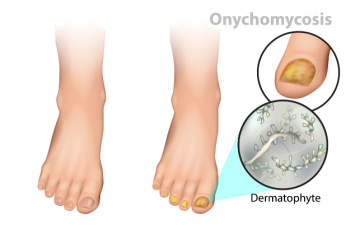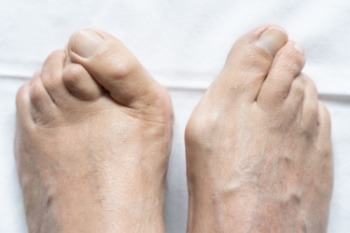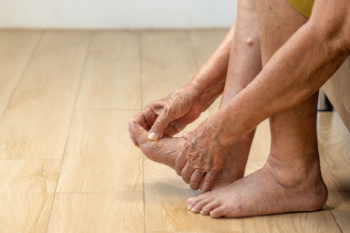
Toenail fungus causes toenails to become brittle, crumbly, discolored, or misshapen. In some cases, the nails may thicken, separate from the nail bed, or emit a foul odor. The fungus thrives in warm, moist environments, making it easy to contract in places like locker rooms or public shower areas. Symptoms include pain or discomfort when wearing shoes or walking. The condition can also spread to other nails or skin, if left untreated. Treating toenail fungus can be challenging, as visible results often take months due to the slow growth of toenails. Available treatments include topical medications, oral antifungal drugs, and laser therapy. Podiatrists often recommend a combination of oral and topical treatments for the best results. However, oral medication may come with side effects, and topical treatment may not be as effective for severe cases. If you have toenail fungus, it is suggested that you schedule an appointment with a podiatrist.
If left untreated, toenail fungus may spread to other toenails, skin, or even fingernails. If you suspect you have toenail fungus it is important to seek treatment right away. For more information about treatment, contact Darline Kulhan, DPM of Scarsdale Foot Specialists PC. Our doctor can provide the care you need to keep you pain-free and on your feet.
Symptoms
- Warped or oddly shaped nails
- Yellowish nails
- Loose/separated nail
- Buildup of bits and pieces of nail fragments under the nail
- Brittle, broken, thickened nail
Treatment
If self-care strategies and over-the-counter medications does not help your fungus, your podiatrist may give you a prescription drug instead. Even if you find relief from your toenail fungus symptoms, you may experience a repeat infection in the future.
Prevention
In order to prevent getting toenail fungus in the future, you should always make sure to wash your feet with soap and water. After washing, it is important to dry your feet thoroughly especially in between the toes. When trimming your toenails, be sure to trim straight across instead of in a rounded shape. It is crucial not to cover up discolored nails with nail polish because that will prevent your nail from being able to “breathe”.
In some cases, surgical procedure may be needed to remove the toenail fungus. Consult with your podiatrist about the best treatment options for your case of toenail fungus.
If you have any questions, please feel free to contact our office located in Scarsdale, NY . We offer the newest diagnostic and treatment technologies for all your foot care needs.

A bunion is a bony bump that forms when the big toe joint shifts out of alignment, often due to genetics, wearing improper footwear, flat feet, or arthritis. Over time, the joint becomes swollen, painful, and stiff, making walking uncomfortable. There are different types of bunions. The most common is the classic bunion, which develops on the inside of the foot at the base of the big toe. A tailor’s bunion, or bunionette, forms on the outside at the base of the little toe. A dorsal bunion occurs on the top of the big toe joint, often limiting movement and making shoe wear painful. Treatment varies based on severity. Wider shoes, padding, orthotics, and toe exercises can help, and severe cases may require injections or surgery. Since bunions worsen over time, it is suggested that you see a podiatrist for early intervention and to prevent complications.
If you are suffering from bunion pain, contact Darline Kulhan, DPM of Scarsdale Foot Specialists PC. Our doctor can provide the care you need to keep you pain-free and on your feet.
What Is a Bunion?
Bunions are painful bony bumps that usually develop on the inside of the foot at the joint of the big toe. As the deformity increases over time, it may become painful to walk and wear shoes. Women are more likely to exacerbate existing bunions since they often wear tight, narrow shoes that shift their toes together. Bunion pain can be relieved by wearing wider shoes with enough room for the toes.
Causes
- Genetics – some people inherit feet that are more prone to bunion development
- Inflammatory Conditions - rheumatoid arthritis and polio may cause bunion development
Symptoms
- Redness and inflammation
- Pain and tenderness
- Callus or corns on the bump
- Restricted motion in the big toe
In order to diagnose your bunion, your podiatrist may ask about your medical history, symptoms, and general health. Your doctor might also order an x-ray to take a closer look at your feet. Nonsurgical treatment options include orthotics, padding, icing, changes in footwear, and medication. If nonsurgical treatments don’t alleviate your bunion pain, surgery may be necessary.
If you have any questions, please feel free to contact our office located in Scarsdale, NY . We offer the newest diagnostic and treatment technologies for all your foot care needs.

Arthritis in the feet affects many people, with two major types being osteoarthritis, OA, and rheumatoid arthritis, RA. OA typically occurs due to wear and tear on the joints over time, while RA is an autoimmune disease that causes inflammation in the joints. Symptoms of both types of arthritis include pain, stiffness, swelling, and reduced mobility in the feet, often making it difficult to walk or stand for long periods ot time. A podiatrist can help manage arthritis by providing treatment to alleviate pain and improve function. For OA, they may recommend custom orthotics to provide support and reduce pressure on the joints. In cases of RA, a podiatrist might work with other healthcare providers to manage inflammation with medications, and suggest foot exercises to maintain mobility. They can also offer advice on footwear, stretching routines, and, in more severe cases, consider surgical options. If you have arthritis in your feet, it is suggested that you schedule an appointment with a podiatrist for effective relief and mangement solutions.
Arthritis can be a difficult condition to live with. If you are seeking treatment, contact Darline Kulhan, DPM from Scarsdale Foot Specialists PC. Our doctor can provide the care you need to keep you pain-free and on your feet.
Arthritic Foot Care
Arthritis is a joint disorder that involves the inflammation of different joints in your body, such as those in your feet. Arthritis is often caused by a degenerative joint disease and causes mild to severe pain in all affected areas. In addition to this, swelling and stiffness in the affected joints can also be a common symptom of arthritis.
In many cases, wearing ill-fitting shoes can worsen the effects and pain of arthritis. Wearing shoes that have a lower heel and extra room can help your feet feel more comfortable. In cases of rheumatoid arthritis, the arch in your foot may become problematic. Buying shoes with proper arch support that contour to your feet can help immensely.
Alleviating Arthritic Pain
- Exercises that stretch the foot can prevent further pain and injury and increase mobility
- Most of the pain can be alleviated with anti-inflammatory drugs, heat, and topical medications
- Massages can help temporarily alleviate pain.
It is best to see your doctor for the treatment that is right for your needs and symptoms. Conditions vary, and a podiatrist can help you determine the right method of care for your feet.
If you have any questions, please feel free to contact our office located in Scarsdale, NY . We offer the newest diagnostic tools and technology to treat your foot and ankle needs.

Custom orthotics can be used to relieve foot pain and discomfort. They're also used to treat various foot conditions and deformities. Flat feet, bunions, and Morton's neuroma are just a few of the foot conditions that have been known to benefit from the use of orthotics.
Comfy feet are happy feet! Contact us today.
